Monopoly is one of those games that no longer needs an introduction. It is a fair bet that if you are reading this, you were familiar with the game by the time you exited elementary school. Scrabble is not quite as ubiquitous, but it is close. These games are not at all similar. Monopoly is a real estate trading game of cutthroat business transactions intermixed with an exorbitant amount of pure luck, while Scrabble is a game where you are trying to make the most valuable words (crossword style) with the random selection of letters you have and the bonus spaces scattered over the game board. So how do you mix the two?
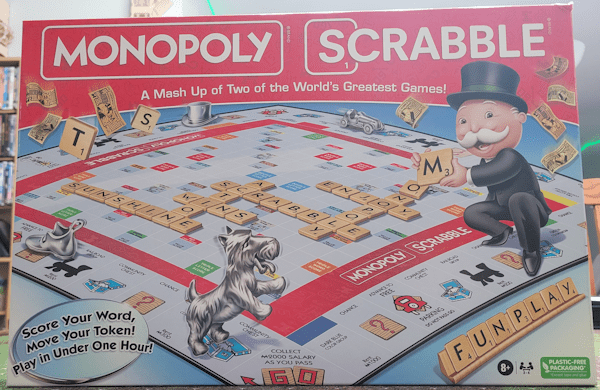
The Mashup
For purposes of this review, I am going to take a Back in the Day approach: I am going to assume that you have at least a cursory knowledge of Monopoly and Scrabble. What I will be describing below is how this game differs as it blends the two games.
The Monopoly Half
In my opinion, Monopoly is not a great game. It is not horrible, by any means, it is just a game that lacks a lot of what I love about board games: agency, planning, etc. That said, there are things you are going to expect if a game claims to be Monopoly. This mash up removes almost all of them. This is what it keeps:
- A board of 40 spaces.
- Go / Jail / Free Parking/ Go to Jail spaces in the corners.
- Collect money as you pass Go.
- Chance and Community Chest spaces/decks.
- Property spaces.
- Pay rent to the owner of a property space when you land on it and it is owned.
Beyond this, nothing that can be called Monopoly is here. And the things they kept? They were kept only in the most cursory manner.
- Original Monopoly has 28 properties and 28 property spaces. This mashup has 10 properties and 14 property spaces.
This means that the number of property spaces you can land on and be forced to pay rent has been cut in half (70% of the spaces down to 35%). Each of the original color groups has one space that represents all of the property in that group; there are still two Utility Spaces and four railroad spaces you can land on. If you own the Railroad Group property, you own all of them. If you own the Utility Group property, you own both of them. If you own the Red Property Group, you own all of them, even though they are all represented by a single space on the board.
- In the original Monopoly, when you land on a property and it is not owned, you can purchase it. This mashup has no purchasing of property at all.
When you land on a property space and it is unowned, nothing happens. The only way to acquire a property is via the Scrabble board (see below), or if you draw a Chance or Community Chest card that gives it to you. In either case, if the property is already owned, you steal it from them.
- In the original Monopoly, there are a total of 6 Chance and Community Chest spaces (never more than two on any side of the board). This mashup has 20 such spaces—five on each side of the board. Literally half of the game’s spaces are telling you to draw a card and do whatever random thing is listed there.
- In the original Monopoly, when you own all of a given group, the rent goes up and you can improve those properties with houses and eventually hotels. This mashup has no such improvements.
- In the original Monopoly, when you pass Go, you get $200. This mashup gives you $2000 when you pass Go, making the most profitable maneuver in the game to simply move as quickly as you can around the board to get the Go money as often as possible.
- In the original Monopoly, rent is not fixed. Color groups have their rent doubled when a player owns all of them, houses and hotels increase the rent, the rent for Utilities is a multiple of the die roll that landed the player on them and increases if someone owns both, Railroads get more expensive when someone owns more of them, etc. This mashup eliminates all of that and sets all rents to a fixed amount.
- In the original Monopoly, Free Parking does nothing. Granted, many house-rule this space to have bonus cash that grows from any payments made to the bank as a result of the spaces and cards. This mashup makes this an official rule. Free Parking always has at least $500 on it. Also, there are two spaces on the board that will send you to Free Parking, making this space effectively three spaces.
- In the original Monopoly, you have dice. This mashup eliminates the dice and governs movement via the turn scores in the Scrabble half of the game. This means that all rules dealing with doubles and such are gone.
- In the original Monopoly, the game ends when one player remains. This mashup has almost no possibility that someone will lose all of their money, meaning that the game ends when all the Scrabble tiles have all been played.

The Scrabble Half
In my opinion, Scrabble is a wonderful game. It is not my top rated game by any means, but it is a game that is very satisfying to play when you are in that particular mood. Monopoly Scrabble leaves the basic game play of Scrabble alone. You have a tray of seven letters and you make words on the Scrabble portion of the board. The bonus spaces on the board, however, are not what you might be used to. They include spaces for double and triple letter/word scores, sure, but the majority of the bonus spaces are marked with one of the ten property groups—when your played word crosses one or more of these, that player immediately becomes the owner of that group. Then, you calculate the score of the word (or words). Unfortunately, nothing about this score gets you points, instead, the score is nothing more than the effective dice roll on the Monopoly board (i.e., if you score 27 points, you advance your token 27 spaces on the Monopoly board).
Using all seven letters is no longer a 50 point bonus, but grants you a $500 bonus.
Also, there is a tray with seven letters owned by the bank. A player may purchase any of those letters for $100, but they must be used on the same turn they were purchased. The bank refills at the end of that turn, and takes their letters first.
The game ends after the bag of letters is empty and either a player plays their last letter, or nobody can play any more words.
Final Score
When the game end is triggered, all of the properties are converted into their cash value and the player with the most money wins.
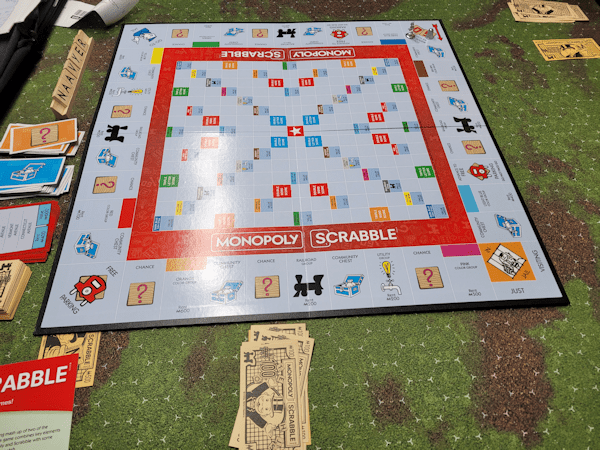
Thoughts
When I first saw this game, I was intrigued! The idea that you could eliminate the random nature of the die rolls with skillful play at Scrabble was something that I thought could be an improvement. Unfortunately, everything that would allow you to use any skill is removed by the fact that an even more unpredictable random element has replaced all of this: Chance and Community Chest. With half of the Monopoly board spaces composed of these two spaces, you are subject to the whims of the cards for half your moves. Most of these cards are “Advance here” or “take possession of this property group” so landing on something to be forced to pay rent is mostly going to come from one of these cards.
But fear not! This is not going to happen very often. In the games I have played despite player count (2, 3, and 4), the typical game results in someone having to pay rent perhaps 2-6 times total. And by total, I mean the total of all players.
In the end, this just feels like a game of Scrabble with the scores you achieve not directly being applied to the final score. This means you can play a perfect game of Scrabble, and still lose because someone was advanced to Go for a $2000 bonus more often than you were. Perhaps if this has been Scrabble and some auto racing game instead of Monopoly? I do not know.
I had a conversation with my wife after the last game we played. We both agree that there is a decent game that could have been created here. We might have to break out our standard Scrabble game and a standard Monopoly game and see if this works if you just replace the dice with the scores of the words you play and see if that plays better than this. With this mashup, however, so much is removed from both halves of this game that the end result feels like it is far less than the sum of its parts. It’s a “you got sand in my peanut butter” situation. The game ends up being boring.
To hammer that last point home: the most exciting thing that happened in all the games we played was when my wife played a 42 point word. She completely circled the board, passing Go and collecting $2000, then advanced two spaces to a Chance space where the card advanced her to Go so she could collect another $2000.
Whoopie.


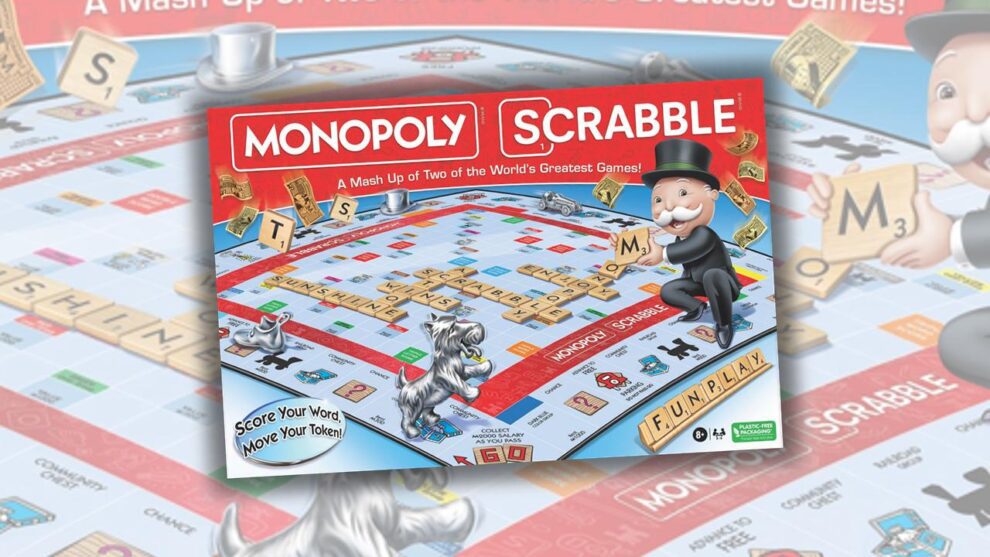

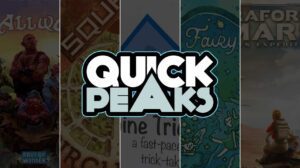
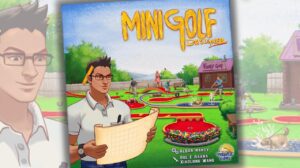
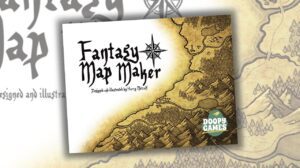
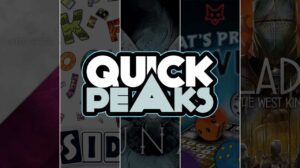




Hey there! Just wanted to say, awesome job on the review. The way you broke down how Monopoly and Scrabble were mashed into one game was super interesting and clear. I was curious though, does the game bring any of the classic Scrabble feel, like strategizing word placement or is it more about blending with Monopoly? How does scoring work in this hybrid setup? It seems like a fun combination, but I’m wondering how closely it stays true to the original games. Thanks again for the great review.
Scrabble is reduced to a movement mechanism and a property grab. The points you score only matter to determine how far you move. And in the end, it is quite disappointing, to be honest.